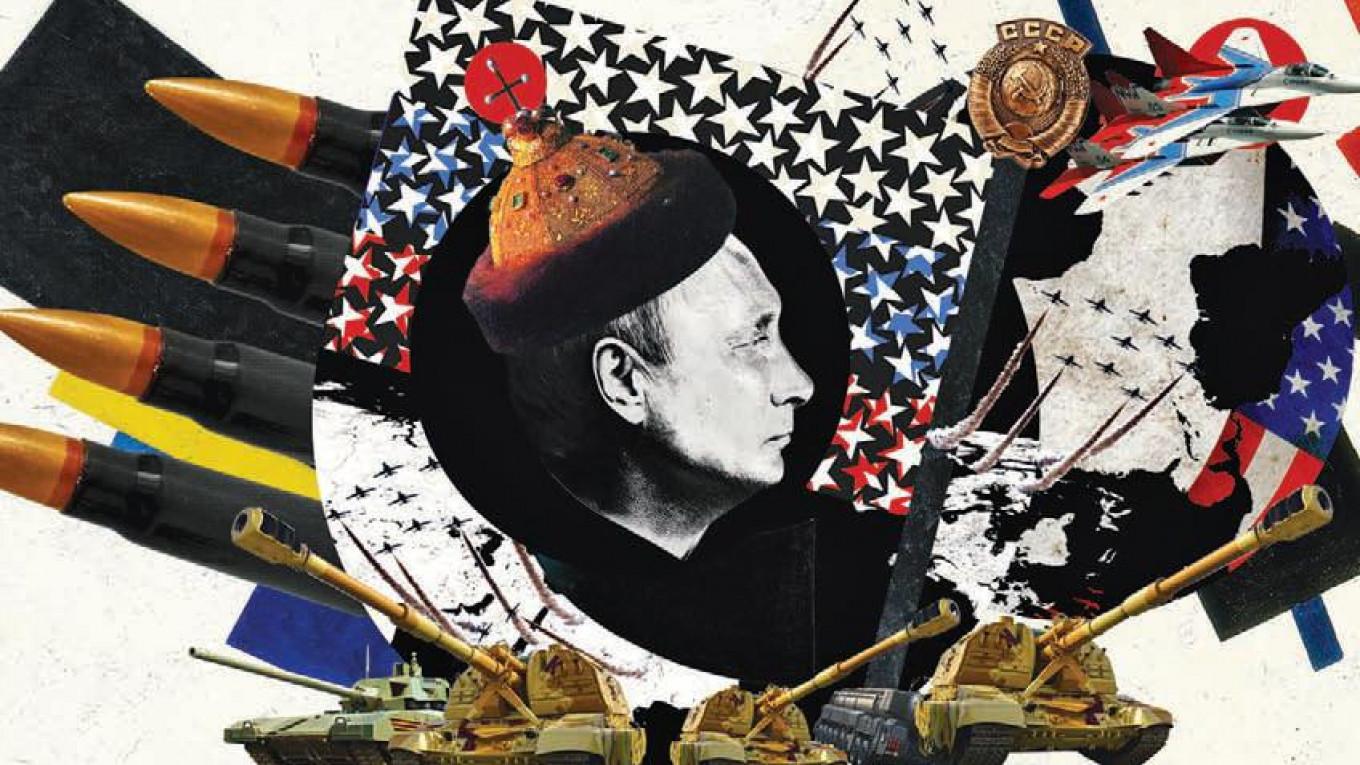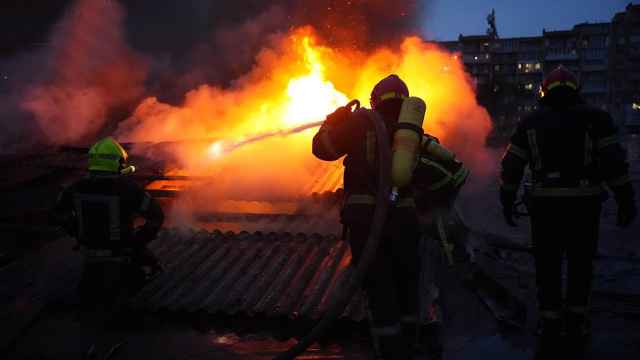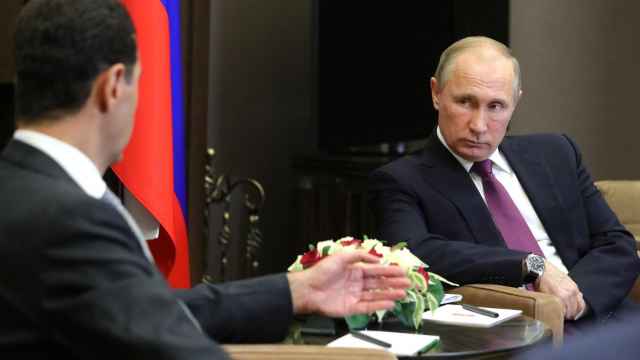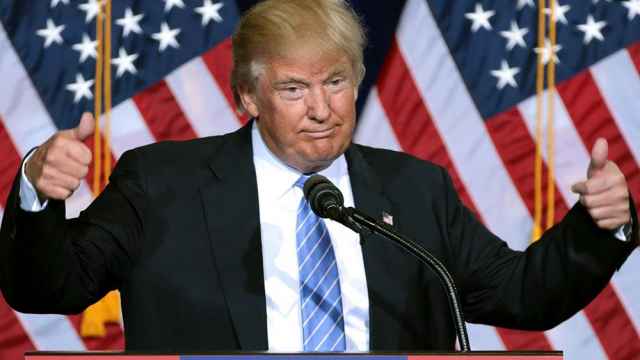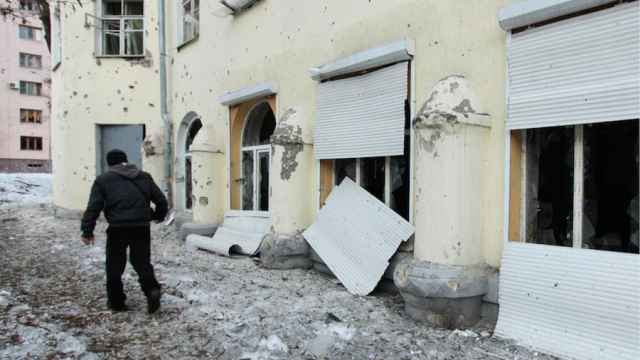In 2016, Donald Trump rode a wave of popular discontent to the White House on the promise that he would “make America great again.” As Russia’s presidential election, scheduled for March 2018 draws nearer, President Vladimir Putin may try a similar tactic — by contending that he has already restored Russia’s greatness.
Since annexing Ukraine’s Crimean peninsula in 2014, Russia has increasingly asserted its role on the global stage.
The Kremlin has ignited a separatist movement in eastern Ukraine and supported the unrecognized “people’s republics” that emerged there. In 2015, Russia entered the longstanding Syrian civil war in support of embattled Syrian President Bashar Assad. Trump’s electoral victory and the demise of the Western consensus against Russia’s violation of international law has also been a major coup for the Kremlin.
These events have all catapulted Putin to the position of a powerful broker in the international arena and fulfilled the country’s longstanding desire for international influence. They signify that, “Russia is once again a global player on par with the United States—much like the USSR was thirty years ago,” says Alexei Levinson, a sociologist at the Levada Center.
Russia’s quest for global influence won’t end in the near future. Observers suggest that the upcoming presidential election will be utterly predictable, lacking real competition. As a result, Putin will likely spend 2017 demonstrating Russia’s global greatness to spur enthusiasm and drive Russians to the polls.
This does not mean that Russia will rush to war, says political analyst Vladimir Frolov. But it does mean the Kremlin must project an image of strength abroad. “The idea is to show influence,” he says. Putin will need to “make headlines, assert Russia’s global presence and demonstrate that it is returning its spheres of influence.”
New Adventures
Earlier this month, it emerged that Russia had deployed a 22-member special forces unit to a base in western Egypt, near the Libyan border. Russia’s goal is likely to support Khalifa Haftar, a renegade Libyan National Army general who currently controls most of the country’s east and poses a serious challenge to the UN-backed government in Tripoli.
The Kremlin’s support for Haftar is not new—the general made two high-profile visits to Moscow in 2016, and signed a series of undisclosed agreements with the Russian military in January. But it is significant because it undermines UN efforts to stabilize the north African country.
The deployment shows that Russia is thinking “not just about its continued presence in Syria, but in the Greater Middle East,” says Alexei Malashenko, a regional analyst at the Dialogue of Civilizations foundation.
And it isn’t limited to the Middle East. Recently, Russia has also increased its role in Afghanistan. In February, the Kremlin organized an Afghanistan peace conference in Moscow that brought together representatives from Afghanistan, Pakistan, India, China, and Iran. Notably absent were the United States and other NATO coalition members.
Russia has also advocated for including the Taliban in any solution to the conflict in Afghanistan, presenting the Islamist militants as a bulwark against the Islamic State (IS). In February, Gen. John Nicholson, commander of U.S. military operations in the country, alleged that Russia had increased covert and overt support for the Taliban to undermine the U.S. and NATO in Afghanistan.
Russia has sincere concerns about conflict spillover from Afghanistan into Central Asia, says Malashenko. But it is also using the IS and Taliban presence in Afghanistan to assert the role of the Collective Security Treaty Organization (CSTO), a Russia-led military alliance of post-Soviet states in the region.
Europe could also serve as another staging ground for restored Russian influence. As political uncertainty grows in the EU, Russia is reasserting its influence in the Balkans.
Earlier this month, when EU foreign affairs representative Federica Mogherini spoke in the Serbian parliament, a group of pro-Russia parliamentarians met her with chants of “Serbia! Russia! We don’t need the EU!”
On March 20, David McAllister, chair of the European Parliament Committee on Foreign Affairs, accused Russia of deliberately destabilizing Serbia in order to prevent the Balkan country from joining the EU. He has also alleged that Russia supports nationalist leaders throughout the Balkans.
In Montenegro, two Russian intelligence officers stand accused of masterminding a failed coup on election day in October 2016 to prevent the Balkan nation from joining NATO. Last month, a Montenegrin special prosecutor stated that “Russian state bodies were involved on a certain level.”
Any move that destabilizes the Balkans would send a strong message to the West: Russia is a critical regional powerbroker.
Displays of superpower status “could be a trump card in the election,” says Denis Volkov of the Levada Center, “but the demonstration of Russia’s global role has to be plausible.”
Hesitation Blues
So far, there is no consensus in the Kremlin on whether to boost tension in Serbia. “Cooler heads understand it may be riskier than [involvement] in Syria,” says Frolov.
Meanwhile, decisionmakers must take into account the public mood. Last year, polls repeatedly showed that Russians are tired of war. Armed conflicts are increasingly seen as an irrational waste of resources, and human losses—first in Ukraine, then in Syria—as something Russia doesn’t need.
The Russian public sees the country’s newly achieved superpower status as a source of international respect, but Russians are more eager for this status to be used for dialogue, than for confrontation, says Volkov.
“The feeling is: ‘Now we can’t be ignored,’” he says.
As a result, the challenge for the Russian leadership will be to avoid backsliding into real conflicts that might undermine stability, something Russians hold dear.
Putin seems to understand this, says Fyodor Lukyanov, editor-in-chief of the journal Russia in Global Affairs. He is too cautious to attempt a full-scale restoration of Soviet grandeur.
“Besides Syria [and Ukraine], it’s either isolated local episodes, or just talk,” Lukyanov says.
So far, there is no clear indication that the Kremlin has decided on a central idea for Putin’s electoral platform. One of the challenges for the Kremlin will be addressing economic stagnation and declining living standards that will likely persist in Russia for a few more years. The other will be getting voters to the polls. But nostalgia for Soviet greatness could still drive electoral mobilization. Recent debates over holding the election on the fourth anniversary of the Crimean annexation reflect an appeal to that nostalgia.
Russia’s global influence will be a key part of the campaign, but the nostalgia card has already been played, says Lukyanov.
“Putin will have to explain why Russians need [global influence] and what they get from it,” he says.
Political consultant Evgeny Minchenko frames the issue more bluntly: Restoring Russia’s superpower status was the purpose of Putin’s third term.
“Now the question is ‘what’s next?’” he says.
A Message from The Moscow Times:
Dear readers,
We are facing unprecedented challenges. Russia's Prosecutor General's Office has designated The Moscow Times as an "undesirable" organization, criminalizing our work and putting our staff at risk of prosecution. This follows our earlier unjust labeling as a "foreign agent."
These actions are direct attempts to silence independent journalism in Russia. The authorities claim our work "discredits the decisions of the Russian leadership." We see things differently: we strive to provide accurate, unbiased reporting on Russia.
We, the journalists of The Moscow Times, refuse to be silenced. But to continue our work, we need your help.
Your support, no matter how small, makes a world of difference. If you can, please support us monthly starting from just $2. It's quick to set up, and every contribution makes a significant impact.
By supporting The Moscow Times, you're defending open, independent journalism in the face of repression. Thank you for standing with us.
Remind me later.


